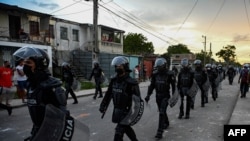U.N. High Commissioner for Human Rights Michelle Bachelet is calling on Cuban authorities to release those arrested during mass demonstrations protesting the government’s failed economic policies.
These are the biggest anti-government demonstrations Cuba has seen for decades. Thousands of people have come out to vent their anger at government policies, which have led to the economic collapse of this Caribbean island state.
Anti-government activists in Cuba estimate more than 100 protesters have been arrested during the weeklong demonstrations. U.N. rights chief Michelle Bachelet is calling for the prompt release of those detained.
Her spokeswoman, Liz Throssell, says Bachelet deplores the government arrest of people for exercising their rights to freedom of peaceful assembly, or freedom of opinion and expression.
"It is particularly worrying that these include individuals allegedly held incommunicado and people whose whereabouts are unknown," Throssellsaid. "We are also very concerned at the alleged use of excessive force against demonstrators in Cuba and deeply regret the death of one protester in Havana. It is important that there is an independent, transparent, effective investigation, and that those responsible are held accountable.”
Miguel Diaz-Canel became president of Cuba in 2018. He is the first person other than the Castro brothers, Fidel, and Raoul, to rule this communist state in almost 60 years. The economy under his guidance has taken a battering.
People have come out en masse to show their displeasure at high food prices, shortages of medicine and other commodities, and at what they perceive to be government mishandling of the COVID-19 pandemic.
The government blames Cuba’s economic crisis on the decadeslong U.S. embargo. However, experts agree the government’s Soviet-style, centrally planned economy and lack of market reforms must share the blame for stifling the country’s economic growth.
Bachelet is urging the Cuban government to address the protesters’ grievances through dialogue and to respect peoples’ rights to protest peacefully. She is calling for the Internet and social media, cut off by the government to quell dissent, to be restored.
Bachelet reiterates her appeal for the lifting of unilateral sectoral sanctions, which she says harm human rights, including the right to health.




